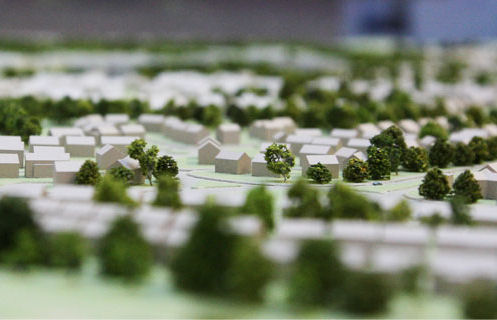New housing, commercial and infrastructure developments are set to be “nature positive” from November onwards, the government has announced, with the plans backed by £16 million of funding for Local Planning Authorities and guidance to support the new approach.
New developments will be delivered in a way which protects and enhances nature, while ensuring England gets the high quality homes it needs.
Developers in England will be required to deliver 10% “Biodiversity Net Gain” when building new housing, industrial or commercial developments so there is a positive benefit for nature.
This means they will have to assess the type of habitat affected and its condition before submitting plans to the local planning authority detailing how they will deliver a 10% benefit for nature.

Biodiversity Net Gain is a key part of the government’s commitment to halt and reverse species decline by 2030 and was introduced into legislation through the world-leading Environment Act.
The information published today will provide certainty to developers ahead of the new approach coming into effect later in the year, and help them enhance habitats to ensure they are left in a measurably better state than they were pre-development. Small sites will be subject to a longer transition period until April 2024, and exemptions have been made for developments such as self-build homes to ensure implementation is targeted towards developments which would generate the most impact.
Developers will be required to demonstrate how they are replacing and improving biodiversity, with “biodiversity metric trading” rules requiring that any habitat affected within the boundary is replaced on a ‘like for like’ or ‘like for better’ principle.
Biodiversity improvements on-site will be encouraged, but in circumstances where they are not possible, developers will be able to pay for improvements on other sites elsewhere by purchasing “units” via a private, off-site market. A government-run statutory credit scheme is being set up which developers will be able to access as a last resort.
Environment Secretary Therese Coffey said: “Biodiversity Net Gain will ensure new developments work for both wildlife and people by creating nature-rich places whilst ensuring that communities get the new homes they need.
“We will continue to support and work with developers and planning authorities ahead of the introduction of Biodiversity Net Gain. We want to help them ensure the developments of the future enhance biodiversity by creating thriving places for plants and wildlife, as outlined under our pioneering Environmental Improvement Plan.”
Levelling Up Secretary Michael Gove said: “Biodiversity is a vital part of our mission to create vibrant, green places that people are proud to call home.
“We want to make sure developers enrich local wildlife when delivering new homes and infrastructure across the country.
“This new requirement alongside our Levelling Up and Regeneration Bill will do just that, helping to protect our natural environment for generations to come.”
Tony Juniper, Chair of Natural England, said: “For decades Nature has been diminishing around us at an alarming rate, with England one of the most nature depleted countries on earth. We need significant, collaborative action to reverse this decline and put nature on the road to recovery.
“There are many good examples of biodiversity net gain in action already with many developers already embracing it. We will continue to support developers, land managers and local authorities to create sustainable developments that both enhance nature and provide beautiful and healthy places for people to live.”
How Biodiversity Net Gain is enforced and delivered has been subject to a consultation on regulations and implementation. The government confirmed:
- £16 million funding will allow Local Planning Authorities with planning oversight to expand resource and upskill teams, including ecologists. This will increase their capacity to work with developers and communities to help secure a long-lasting legacy for nature.
- A phased introduction for Biodiversity Net Gain, with small sites having until April 2024 to comply with the regulations. This extension will give Local Planning Authorities and smaller developers more time to prepare and apply best practice from activity on major development sites.
- Details of a statutory credit scheme – a last resort option for Biodiversity Net Gain’ delivery, which will be set up to prevent delays in the planning system. In order to buy credits, developers will have to demonstrate they cannot deliver habitat onsite, or via the off-site market. The proceeds will be invested in habitat creation.
- Draft legislation is due to be published later in 2023, with further stakeholder engagement taking place on implementation before Biodiversity Net Gain becomes mandatory in November.
The government has also published guidance for land managers who wish to sell to the Biodiversity Net Gain market. This provides information on combining environmental payments with Biodiversity Net Gain, including nutrient mitigation credits, grant payments or selling to other voluntary markets (e.g. carbon markets).
These proposals will achieve better outcomes for nature and people, with the potential for millions of pounds to be invested in environmental impact mitigation by developers every year.
Brian Berry, Chief Executive of the FMB said: “It’s good to finally have some clarity about the new biodiversity net gain regulations. Many small house builders have been worried about these new changes and the impact they could have on delivering new homes. The Government must ensure small house builders are supported to deliver it, especially on brownfield sites which could be particularly affected and are the traditional sites chosen by smaller developers. Small house builders already face a tranche of new rules and regulations, all upping cost and complexity to building new homes, so targeted support to help them deliver biodiversity net gain will be key.”
Simon McWhirter, UKGBC’s Director of Communications, Policy and Places said: “The Government’s proposed direction and new guidance on Biodiversity Net Gain (BNG) is broadly encouraging and has clearly heeded much of UKGBC’s, and the wider built environment sector’s, advice. Decisions to include brownfield sites, to legislate to further protect irreplaceable natural habitats, and to prevent duplicating the recording of BNG and carbon offsets will be welcomed by our members.
“However, by extending the transition period for small sites until April 2024, the Government risks removing up to 100,000 developments a year from the scope of biodiversity regulations – impeding nature’s recovery instead of supporting the industry with the clear, stable demand called for by Chris Skidmore MP to secure green growth. The Government has also missed the opportunity to outline how biodiversity net gain could develop into the broader concept of ‘environmental net gain’ that would integrate and deliver the wider social benefits of nature-positive built environments.
“Together with our more than 700 members and our partners across the sector, UKGBC will be engaging closely with the Government to call for the more tangible, trackable commitments urgently needed to reverse nature’s decline by 2030.”




















